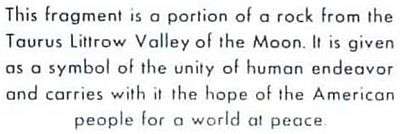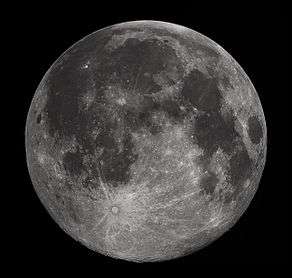Nicaragua lunar sample displays
.svg.png)
The Nicaraguan lunar sample displays are two commemorative plaques consisting of small fragments of moon specimen brought back with the Apollo 11 and Apollo 17 moon missions and given in the 1970s to the people of Nicaragua by United States President Richard Nixon as goodwill gifts.[1][2]
Description
Apollo 11
The Nicaragua Apollo 11 lunar sample display commemorative podium style plaque consists of four rice-size "moon rock" particle specimens collected by Apollo 11 astronauts Neil Armstrong and Buzz Aldrin in 1969 and a small Nicaraguan flag that was taken to the moon and back on Apollo 11.[1] The 4 "moon rocks" weigh about 0.05 grams total and are entirely enveloped in a clear plastic ball the size of a coin which is mounted to an approximately one foot square wooden display board on a small podium pedestal. The small sample display plaque also has mounted, directly below the "goodwill moon rocks", a small Nicaraguan flag that went to the moon and back on Apollo 11. The lunar sample display plaque was given to the people of Nicaragua as a gift by President Richard Nixon. Similar lunar sample displays were also given to all the states and territories of the United States and all the countries of the world.[1]
Apollo 17

The Nicaragua Apollo 17 lunar sample display commemorative style plaque, 10 by 14 inches in size, consists of one "moon rock" particle specimen cut from lunar basalt 70017 and a Nicaraguan flag. The basalt 70017 was collected by Apollo 17 astronaut Harrison Schmitt on the moon in 1972. Once brought to earth from the moon, lunar basalt 70017 was cut into small fragments of approximately 1 gram. The specimen was enveloped in a plastic ball and mounted on the wooden plaque along with the Nicaraguan flag which had been taken to the moon and back by the crew of Apollo 17. In 1973, President Nixon gave the plaque to the country of Nicaragua. He also gave similar Apollo 17 lunar sample plaques to the same recipients that had previously received the Apollo 11 gift plaques, the 134 countries of the world and all the states and provinces of the United States. The gifts were a goodwill gesture to promote peace and harmony.[2]
History
The Nicaragua Apollo 11 lunar plaque display with its moon rocks were originally presented as a gift to the people of Nicaragua by way of then-Nicaraguan dictator Anastasio Somoza Debayle by President Nixon in 1970. The plaque display with the Apollo 11 "moon rocks" was then stolen by a Costa Rican mercenary soldier who opposed the Sandinista Junta of National Reconstruction government in Nicaragua. The plaque was then traded to Baptist missionary Harry Coates, who sold it to Las Vegas casino magnate Bob Stupak by 1987 for $10,000 and 200,000 shares in Stupak's casino. Stupak displayed the plaque at his Moon Rock Café before he decided to hide it away in a safe deposit box.[3]
Attorney Richard Wright, designated attorney for Stupak's estate, sent the Nicaragua Apollo 11 "goodwill moon rocks" plaque display to NASA officials in Houston in May 2012, two and a half years after Stupak's death.[3] Renee Juhans, NASA inspector general executive officer, told reporters in May 2012 that NASA was "taking steps to authenticate" the display it received from attorney Wright. If found to be the authentic Nicaragua Apollo 11 "goodwill moon rocks" commemorative podium plaque display, it would be returned to the government of Nicaragua by NASA.[3][4] The Apollo 11 Moon Rock was returned to the people of Nicaragua in November 2012.[5]
References
- 1 2 3 Pearlman, Robert (1999–2012). "Where today are the Apollo 11 goodwill lunar sample displays?". collectspace.com. Retrieved November 2, 2012.
- 1 2 Pearlman, Robert (1999–2012). "Where today are the Apollo 17 goodwill lunar sample displays". collectspace.com. Retrieved November 2, 2012.
- 1 2 3 Associated Press (23 May 2012). "Moon chips from Vegas casino mogul sent to NASA". Retrieved 13 November 2012.
- ↑ Smith, John L. "Loony or not, moon rock sale didn't fly". Las Vegas Review-Journal. Las Vegas, Nevada. Retrieved November 2, 2012.
- ↑ NASA Moons Nicaragua, Nicaragua Dispatch, November 28, 2012.
Further reading
- Kloc, Joe (February 19, 2012). The Case of the Missing Moon Rocks. The Atavist/Amazon Digital Services, Inc. p. 47. ASIN B007BGZNZ8.
External links
| Wikimedia Commons has media related to Wooden plaques. |
